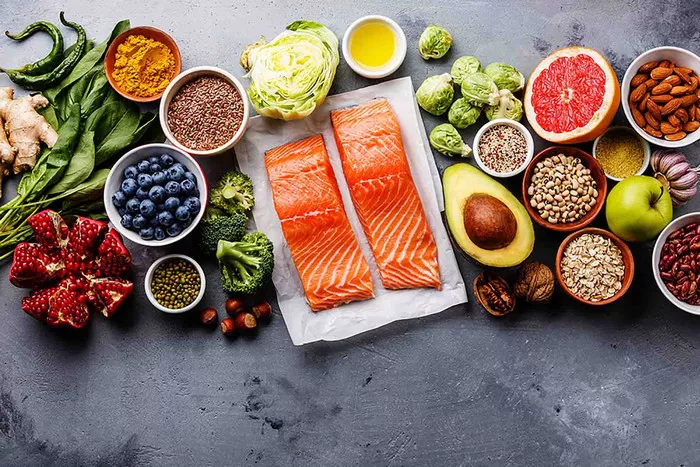Losing belly fat is a common goal for many individuals seeking to improve their health and achieve a more toned physique. While spot reduction is not possible, adopting a healthy, balanced diet plays a crucial role in achieving overall weight loss and reducing belly fat. In this article, we will explore the types of foods that can support your efforts to lose belly fat, along with helpful tips for incorporating them into your diet.
Understanding Belly Fat and Weight Loss
Belly fat, also known as visceral fat, is stored around the abdominal organs and can be associated with an increased risk of various health conditions, including heart disease, type 2 diabetes, and certain cancers. To effectively reduce belly fat, it’s important to focus on overall weight loss through a combination of a healthy diet, regular physical activity, and lifestyle changes.
The Power of a Healthy Diet
When it comes to losing belly fat, a healthy diet is key. Incorporating nutrient-dense foods and making mindful choices can help create a calorie deficit, leading to weight loss. Here are some food groups and types of foods that can support your efforts:
1. Whole Grains
Whole grains are rich in fiber and provide essential nutrients to support overall health and weight loss. They can help you feel full and satisfied, reducing the likelihood of overeating. Opt for whole grain options like brown rice, quinoa, oats, whole wheat bread, and whole wheat pasta.
2. Lean Proteins
Including lean proteins in your meals helps promote satiety and muscle growth, which can aid in the reduction of belly fat. Choose lean sources of protein such as skinless chicken breast, turkey, fish, tofu, legumes, and low-fat dairy products. These options are lower in saturated fat and calories compared to their higher-fat counterparts.
3. Fruits and Vegetables
Fruits and vegetables are essential components of a healthy diet. They are low in calories, high in fiber, and packed with vitamins, minerals, and antioxidants. Incorporate a variety of colorful fruits and vegetables into your meals and snacks to provide essential nutrients while keeping calorie intake in check.
4. Healthy Fats
While reducing overall calorie intake is crucial for weight loss, it’s important to include healthy fats in your diet. Healthy fats, such as those found in avocados, nuts, seeds, and olive oil, provide satiety, support nutrient absorption, and contribute to overall health. However, it’s important to consume these fats in moderation due to their higher calorie content.
5. Protein-Rich Foods
Protein-rich foods can help boost metabolism and promote feelings of fullness, making them an excellent choice for weight loss. Incorporate protein-rich options like eggs, Greek yogurt, cottage cheese, lean meats, fish, legumes, and nuts into your meals and snacks.
6. Hydration
Staying hydrated is essential for overall health and weight loss. Drinking an adequate amount of water throughout the day helps maintain proper bodily functions, supports metabolism, and can aid in appetite control. Make sure to drink water regularly and consider swapping sugary beverages for water or herbal tea.
7. High-Fiber Foods
Including high-fiber foods in your diet can be beneficial for weight loss, as they help promote feelings of fullness and aid in digestion. Opt for foods like beans, lentils, whole grains, fruits, vegetables, and nuts to increase your fiber intake.
8. Portion Control and Mindful Eating
While focusing on the types of foods you eat is important, portion control and mindful eating also play a significant role in weight loss. Pay attention to portion sizes, listen to your body’s hunger and fullness cues, and practice mindful eating by savoring each bite, eating slowly, and being present during mealtime. This can help prevent overeating and promote a healthier relationship with food.
Tips for Incorporating These Foods into Your Diet
Incorporating the foods mentioned above into your diet can support your weight loss journey and help reduce belly fat. Here are some practical tips to help you incorporate these foods:
Meal Planning: Plan your meals ahead of time to ensure you have a variety of nutrient-dense foods available. This can help you make healthier choices and prevent impulsive decisions that may derail your weight loss efforts.
Batch Cooking: Prepare larger batches of healthy meals and portion them into individual servings. This can save time and make it easier to grab a nutritious meal when you’re busy or on the go.
Healthy Snacking: Keep healthy snacks readily available to prevent reaching for unhealthy options. Pre-cut fruits and vegetables, Greek yogurt, nuts, and seeds are all great choices for satisfying and nutrient-dense snacks.
Recipe Modifications: Look for ways to modify your favorite recipes to make them healthier. Swap refined grains for whole grains, use lean protein sources, and incorporate more vegetables into your dishes.
Food Journaling: Keep a food journal to track your intake and identify any patterns or areas for improvement. This can help you become more mindful of your eating habits and make adjustments as needed.
Gradual Changes: Start by making small, gradual changes to your diet rather than attempting to overhaul everything at once. This can make the process more manageable and increase the likelihood of long-term success.
Seek Professional Guidance: If you need additional support or personalized guidance, consider consulting with a registered dietitian or nutritionist. They can provide individualized recommendations and help you create a well-balanced eating plan tailored to your specific needs and goals.
Conclusion
Losing belly fat requires a comprehensive approach that includes a healthy diet, regular physical activity, and lifestyle modifications. By incorporating whole grains, lean proteins, fruits, vegetables, healthy fats, and practicing portion control and mindful eating, you can create a calorie deficit, promote weight loss, and reduce belly fat. Remember that sustainable weight loss takes time and consistency, so focus on making long-term, healthy choices rather than resorting to fad diets or quick fixes. Be patient, stay committed to your goals, and consult with healthcare professionals for personalized guidance and support along your weight loss journey.




















